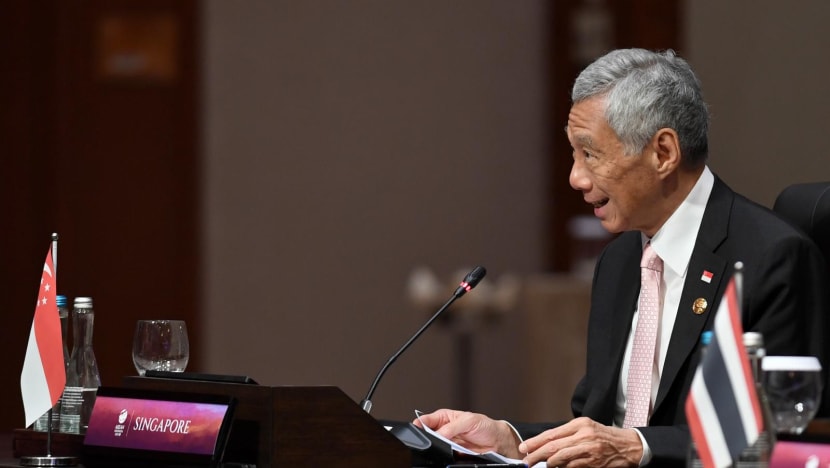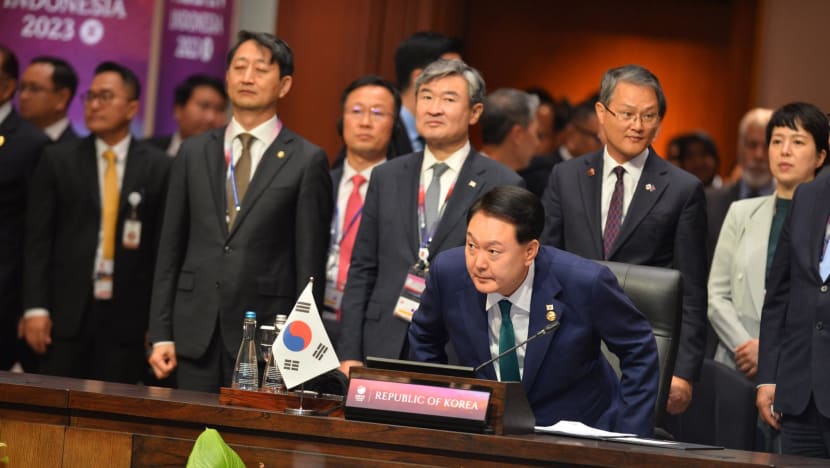US, China need to 'show leadership' to address global issues, crucial for both to continue dialogue: PM Lee
Mr Lee Hsien Loong also expressed concerns about the “worrying” situation in the Korean Peninsula, condemning North Korea’s missile launches for raising tensions.

Singapore Prime Minister Lee Hsien Loong speaking during the ASEAN-China Summit in Jakarta on Sep 6, 2023. (Photo: ASEAN Summit 2023 broadcaster)
JAKARTA: The United States and China need to "show leadership" to address a range of global issues, making it crucial for both to continue dialogue, build strategic trust at all levels and strive for greater cooperation, Prime Minister Lee Hsien Loong said on Wednesday (Sep 6).
Speaking during a summit between the Association of Southeast Asian Nations (ASEAN) and Chinese Premier Li Qiang, Mr Lee added that the region is watching "with great concern" the trajectory of US-China relations.
"ASEAN has a direct interest since tensions could easily stoke existing flashpoints in the region and undermine the peace, prosperity and stability that we have all enjoyed for decades," he said.
Making his maiden appearance in the region since becoming premier in March this year, Mr Li said ASEAN and China share a "relentless pursuit of peace", owing to their "keen understanding about hardships".
"We both have a strong aspiration for development. And we both take real actions to preserve regional stability," he added.
ASEAN's summit with China was the first of several being held by the 10-member bloc on Wednesday with several external partners, including the US.
It is represented by Vice-President Kamala Harris, instead of President Joe Biden who is attending the Group of Twenty (G20) Summit in India later this week.
Separately, in her opening remarks at the ASEAN-US Summit, Ms Harris reiterated that it is in Washington's "vital interests" to grow an Indo-Pacific region that is open, prosperous and secure.
"US-ASEAN economic cooperation represents a huge opportunity for growth ... and the defence and deterrence commitment of the United States and our security presence in the Indo-Pacific helps protect our homeland and ensure regional stability," she said.
Top of the agenda at the ASEAN Summit and related meetings this week is the US-China rivalry that has come under pressure in recent years, stemming from competition on issues ranging from bilateral trade to navigation in the South China Sea, with tensions impacting global economies and stability.
US Secretary of State Antony Blinken’s meeting with Chinese President Xi Jinping during a visit to China in June seemed to have stopped the already strained ties from going into freefall, but analysts are doubtful whether the rival powers can mend their deep divide.
SOUTH CHINA SEA CLAIMS
Mr Lee also touched on the "challenging" issue of the South China Sea. China claims most of the strategic waterway - which is disputed by four ASEAN states and Taiwan - and has built military installations on artificial reefs in contested island chains to bolster its territorial assertions.
China has also released a new map laying claims over large swathes of disputed areas in the South China Sea, triggering protests by Malaysia, Vietnam, Indonesia and the Philippines.
In his speech, Mr Lee urged ASEAN and China to intensify efforts to conclude a Code of Conduct that is in accordance with international law - like the 1982 United Nations Convention on the Law of the Sea - and safeguards the "rights and interests of all parties".
At an ASEAN Foreign Ministers’ meeting in July, ASEAN and China agreed on guidelines to accelerate negotiations on this code of conduct, which would act as a framework for resolving disputes.
Negotiations, originally planned to be concluded in 2021, had stalled due to various reasons including the pandemic.
Underscoring how ASEAN-China cooperation can help both sides to build trust and confidence to address challenging issues like the South China Sea, Mr Lee noted that officials have started negotiations on upgrading the ASEAN-China Free Trade Area to cover emerging areas such as the digital and green economies.
He suggested that ASEAN and China further liberalise their air transport agreement to encourage more people-to-people exchanges, and cooperate on digital economy to make cross-border transactions seamless and sustainable.
These initiatives support the ASEAN Outlook on the Indo-Pacific (AOIP), Mr Lee said, urging the regions to continue pursuing tangible cooperation in the priority areas of maritime, economic, connectivity and Sustainable Development Goals.
During the ASEAN-US Summit, Mr Lee said the AOIP can be used to explore and deepen ASEAN-US cooperation.
"We welcome the efforts of this US administration to enhance cooperation with ASEAN," he said, noting the US' support for the region's green energy transition and cybersecurity.
But Mr Lee said the role of the US has become "more critical" at a time of troubling geopolitics, highlighting that Russia’s invasion of Ukraine is a continuing problem for the world.
A longer-term concern, he said, is the US-China relationship, with Southeast Asia concerned that a miscalculation could draw the region into serious conflict.
"One potential flashpoint is the South China Sea, which is a shared resource for all of us," he said.
Mr Lee said the rights of all states to freedom of navigation and overflight in the disputed waterway should be maintained, as he again called for a code of conduct that is aligned with international law.
"ASEAN’s response to this geostrategic situation is to strengthen our ties with all the major powers," he added.
CHINA SAYS IT PURSUES PEACE, US SAYS COMMITTED TO ASEAN CENTRALITY
During the opening remarks, Chinese Premier Mr Li touted the advanced trade relations and "brotherly ties" between ASEAN and China, pointing to their elevated comprehensive strategic partnership as a "strong testament" of strategic trust between the two.
"No matter how the international situation evolves, China and ASEAN have maintained close exchanges and communication, respected each other's development path and accommodated each other's major concerns," he said.
"We have preserved peace and tranquillity in East Asia in a world fraught with turbulence and change."
He also pointed out how China has reached "important consensus" separately with six ASEAN countries on building a community with their shared future based on a concept introduced by Mr Xi in 2013.
"And we hope to do so with more countries in the future," said Mr Li, without naming the countries though earlier media reports in July identified them as Indonesia, Thailand, Malaysia, Myanmar, Laos and Cambodia.
During the ASEAN-US Summit, Ms Harris said the US is committed to ASEAN centrality, as she announced plans to set up the first-ever ASEAN-US Center in Washington DC.
The centre, established through a public-private partnership, will support official ASEAN engagements as well as exchanges between businesses and academic institutions.
"We have a shared commitment to international rules and norms, and to our partnership in national and regional issues such as the crisis in Myanmar," she said.
Ms Harris said the US will continue to press the Myanmar regime to end the "horrific" violence, release those who are unjustly detained, and re-establish the country's path to inclusive democracy.
"I believe as leaders, we must address global challenges of today, while also investing in a long-term vision," she added.
"The United States and the nations of Southeast Asia share many long-term interests and priorities as well as a long-term vision."
KOREAN PENINSULA SITUATION "WORRYING"
In separate summits on Wednesday, ASEAN leaders also met with South Korea President Yoon Suk-yeol and Japanese Prime Minister Fumio Kishida.
Mr Lee said the situation in the Korean Peninsula situation remains "worrying", and that Singapore has consistently and strongly condemned North Korea's intercontinental ballistic missile launches, most recently in July.
"These have further raised tensions on the peninsula and violated UNSC (United Nations Security Council) resolutions," he said.
Mr Yoon on Tuesday had called on Southeast Asian nations to "join forces" in responding to North Korea's nuclear threats, as Washington warned Pyongyang's leader Kim Jong Un was set to make a rare trip to Russia for arms talks.
"Singapore will continue to work with the international community to promote peace and stability on the Korean Peninsula," Mr Lee said.

During the ASEAN-Japan Summit, Mr Lee said the bloc and Japan share similar concerns on regional peace and security, and called the Korean Peninsula a "potential flashpoint".
In late August, Japan, South Korea and the US conducted drills in international waters off Jeju island, aimed at rehearsing procedures for detecting, tracking and sharing information about incoming North Korean missiles, South Korea's navy said.
Mr Lee said he hopes that "long outstanding" matters, such as the abduction of Japanese citizens by North Korea, could be resolved "at long last".
Japan says North Korea kidnapped at least 17 Japanese citizens during the 1970s and 1980s, apparently so these abductees could train spies in Japanese language and culture, or let their identities be used for espionage aimed mainly at South Korea.
Japan’s government has made the issue a political priority and demanded that North Korea immediately return all the remaining abductees, reported the Associated Press.
DIGITAL ECONOMY, CYBERSECURITY COOPERATION
Mr Lee also called on ASEAN to work more closely with South Korea and Japan in the digital economy and cybersecurity.
"These areas underpin our region’s post-pandemic recovery and will be key engines of growth," he said during the summit with Mr Yoon.
Mr Lee said he looks forward to the finalisation of the ongoing ASEAN-Korea Digital Trade Research Study proposed by South Korea, which will help highlight possible areas for digital cooperation.
"The drive towards digitalisation should be accompanied by equally robust efforts to strengthen cybersecurity," he said.
During the summit with Mr Kishida, Mr Lee called Japan an "active contributor" to ASEAN's capacity building in cybersecurity.
For instance, the 2023 ASEAN-Japan Digital Work Plan charts out cooperation in digital economy, cybersecurity, smart cities, data flows, artificial intelligence and capacity building.
"ASEAN and Japan should continue working towards an open, inclusive and interoperable digital ecosystem," Mr Lee added.

















